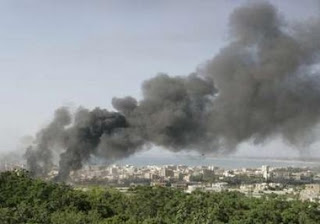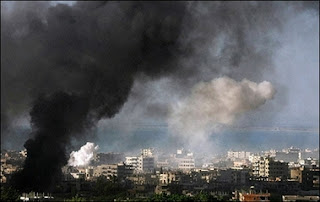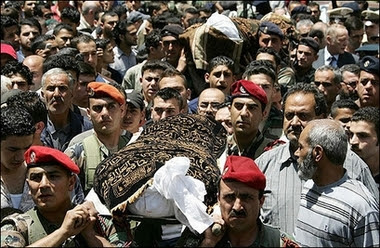Fighting resumed for the third day between the Lebanese army and Islamist militants taking refuge in the Nahr al-Bared camp Palestinian refugee camp near Tripoli.
Fatah al-Islam members fired on rescuers who were attempting to evacuate injured civilians from the camp.
For the second night in a row a bomb was set off in a Beirut market, BBC Video HERE.
Smoke rises from the Palestinian Nahr al-Bared refugee camp as Lebanese army tanks shelled positions held by Fateh al-Islam fighters in northern Lebanon May 21, 2007. Battles engulfed the Palestinian refugee camp in north Lebanon on Monday and the death toll from two days of fighting between the Lebanon army and al-Qaeda-inspired militants climbed to 71. (REUTERS/ Mohamed Azakir)
Fatah al-Islam fighters spread out across the Nahr al-Bared refugee camp and fired on rescuers who were attempting to evacuate injured civilians.
Naharnet reported:
Sources in Nahr el-Bared, which has an estimated population of 40.000 refugees, told Naharnet around 200 fighters from Fatah al-Islam streamed across the narrow alleys of the camp opening fire from assault rifles at rescuers trying to evacuate civilians wounded in the cross-fire.
Wedad, a Native of the camp, told Naharnet by telephone the terrorists are “using us as human shields.”
“They have taken the population hostage. They even interrupted the evacuation of the wounded civilians. They opened fire at civilians who were trying to run away from the camp” to safer areas in the nearby Baddawi camp and the northern town of Triploi, said Wedad who was reached through her mobile telephone.
Abdul Qader, a 50-year-old resident of the camp, said about 150-200 armed elements from Fatah al-Islam carried out a broad-front advance from their beach enclave across the narrow streets of the camp and took up sniping nests on rooftops and in residential apartments from which they opened fire on rescuers and Lebanese troops.
Abdul Qader, himself a veteran Palestinian guerrilla who had fought for the mainstream Fatah faction, said terrorists had brought in seaborne support by fishing boats from neighboring Syria to fight what appears to be a final showdown with the Lebanese army.

Smoke billows from the Palestinian refugee camp of Nahr al-Bared in north Lebanon. Lebanese troops bombarded Islamist militiamen with tank shells and heavy artillery on Monday, the second day of the bloodiest internal fighting since the civil war that has now left 58 people dead and raised fears about Lebanon’s fragile security.(AFP/Ramzi Haidar)
Surprise! Blacksmiths of Lebanon offers this:
Meanwhile, the Lebanese Forces official website is reporting the arrest of a Syrian man in the Sid el Baouchrieh suburb of the capital, after he was stopped by an ISF patrol and found to be in possession of bomb making materials.

Lebanese soldiers carry the bodies of their colleagues during their funeral procession in the northern Lebanese city of Tripoli. The Lebanese government offered late Monday a truce in its confrontation with Islamists in north Lebanon that cost 58 lives, as a bomb exploded in Beirut for the second straight night.(AFP/Ramzi Haidar)
Fighting resumed at the Palestinian camp this morning. Fatah al-Islam took responsibility for the bomb attacks at the Beirut malls- AFP reported:
The new bout of fighting between troops and the Sunni Muslim Fatah al-Islam militants shattered an overnight lull and followed indirect negotiations to try to reach a ceasefire amid mounting fears of a humanitarian crisis for people trapped inside Nahr al-Bared.
Fatah Al-Islam remained defiant, with spokesman Abu Salim Taha insisting in a telephone call with AFP that “if the army continues its attacks, our fighters are ready to fight until the last drop of blood.”
The group, which had warned it would take its fight beyond Nahr al-Bared and the nearby Mediterranean port city of Tripoli, also claimed in a statement it was behind two bomb attacks in Beirut over the past two nights.
From Beirut to the Beltway has more on the Beirut bombings.
Identity checks of the militants killed in the fighting have revealed that most of them are not Palestinians, but have different nationalities.
Atlas has a roundup on the jihad against Lebanon.
Jules Crittenden has links.
Snapped Shot– the violence may be spreading to other camps.
Previously:
Lebanese Troops Battle Syrian Sponsored Al Qaeda Group- 48 Dead!
Death Toll at 65 in Lebanon- Wanted Terrorist Among Dead
UPDATE: UN aid convoy which entered the Nahr al-Bared camp has been fired upon. There are reports of casualties.
UPDATE 2: Stratfor has extensive analysis on the leaders of Fatah al-Islam. Here is an excerpt:
Shaker Abssi, who heads Fatah al-Islam, is said to have links with former al Qaeda in Iraq leader Abu Musab al-Zarqawi. Along with al-Zarqawi, Abssi was sentenced to
death in Jordan for his suspected involvement in the 2002 killing of a U.S. diplomat in Amman. He served a three-year jail sentence in Syria and then moved into Nahr al-Bared to set up Fatah al-Islam. It appears Damascus helped facilitate Abssi’s new base of operations, and has used him as a point-man to manage the group’s activities. Nahr al-Bared is located close enough to the Syrian border to allow easy transit between Syria and Lebanon. Fatah al-Islam could not have used force to take control over the camp without strong backing from Syrian intelligence officers in the region.Fatah al-Islam is of use to Syria in a variety of ways. The Alawite-Baathist regime in Damascus long has been adept at funneling different shades of militants across its borders and using militant proxies in Lebanon for its own political aims, regardless of religious, ideological or political orientation. By turning a blind eye to foreign jihadists traveling to Iraq to fight, for example, Syria has promoted itself as an integral piece to any negotiations the United States conducts over Iraq to control the Iraqi insurgency.
Syrian intelligence and security forces in the region also have facilitated the movement of many of these jihadist-oriented militants into Lebanon, which became most apparent with the surfacing of Fatah al-Islam in November 2006. Syrian intelligence recently permitted a fundamentalist officer named Khalid Najjar to enter Lebanon. Najjar has been on a mission on behalf of Syrian military intelligence to facilitate the arrival of Fatah al-Islam recruits from the Yarmuk refugee camp in Damascus to the Nahr al-Bared camp in northern Lebanon. Syria’s ability to manage these jihadists is questionable, however, considering the jihadists view the Alawites as kuffar (unbelievers). Though Syria has an interest in demonstrating to the United States that it can rein in the jihadists if need be, these militants could be operating more as mercenaries than as militants motivated purely by ideology.
Though Syria’s Alawite rulers are more ideologically in tune with Hezbollah than the Palestinian factions are, the Syrian government understands that Hezbollah has its own political considerations and so Damascus cannot rely as heavily on the Shiite militant group to carry out politically motivated attacks in Lebanon. A Palestinian faction such as Fatah al-Islam is seen as a more expendable insurance policy for Damascus, and better suited for this type of militant activity. Many of Fatah al-Islam’s cadres have been waiting to go and fight in Iraq, but have been kept in Nahr al-Bared by their handlers, thus giving Syria substantial control over how it negotiates with the United States regarding its “commitment” to crack down on the flow of insurgents.
Hat Tip Andy Stewart and BG
